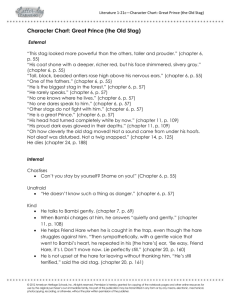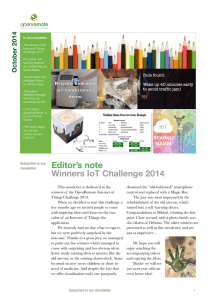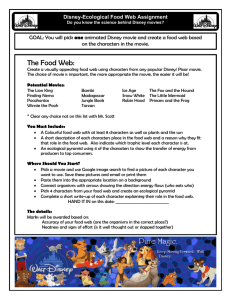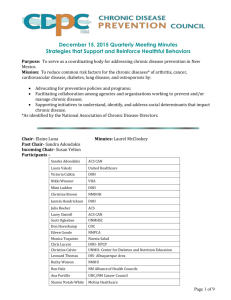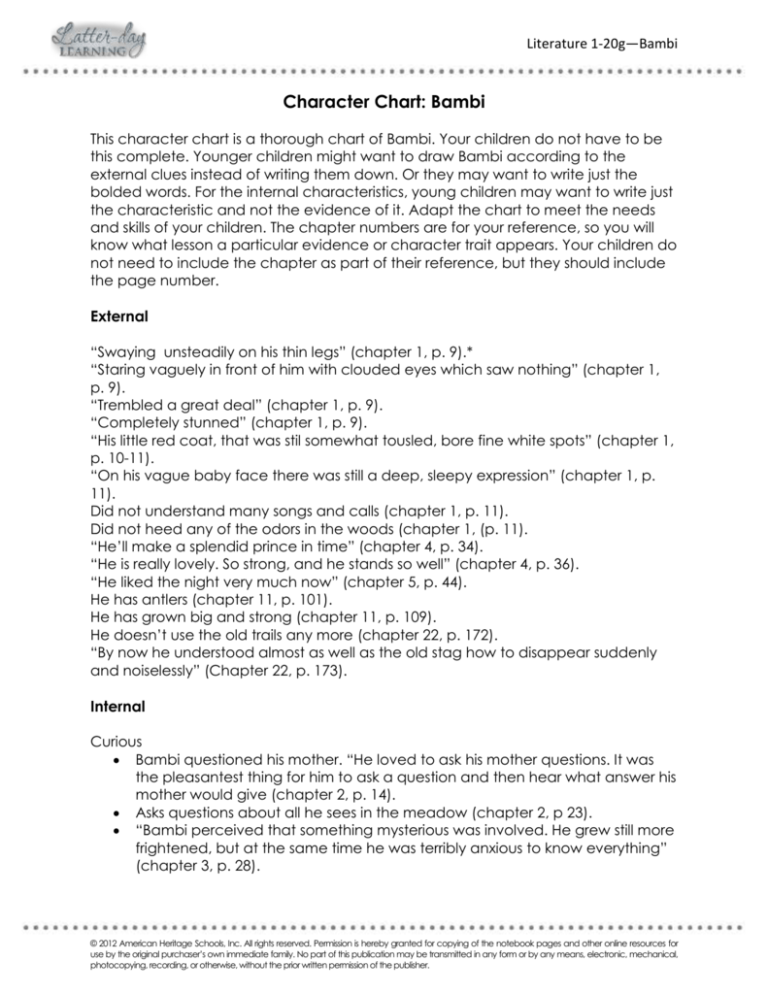
Literature 1-20g—Bambi
Character Chart: Bambi
This character chart is a thorough chart of Bambi. Your children do not have to be
this complete. Younger children might want to draw Bambi according to the
external clues instead of writing them down. Or they may want to write just the
bolded words. For the internal characteristics, young children may want to write just
the characteristic and not the evidence of it. Adapt the chart to meet the needs
and skills of your children. The chapter numbers are for your reference, so you will
know what lesson a particular evidence or character trait appears. Your children do
not need to include the chapter as part of their reference, but they should include
the page number.
External
“Swaying unsteadily on his thin legs” (chapter 1, p. 9).*
“Staring vaguely in front of him with clouded eyes which saw nothing” (chapter 1,
p. 9).
“Trembled a great deal” (chapter 1, p. 9).
“Completely stunned” (chapter 1, p. 9).
“His little red coat, that was stil somewhat tousled, bore fine white spots” (chapter 1,
p. 10-11).
“On his vague baby face there was still a deep, sleepy expression” (chapter 1, p.
11).
Did not understand many songs and calls (chapter 1, p. 11).
Did not heed any of the odors in the woods (chapter 1, (p. 11).
“He’ll make a splendid prince in time” (chapter 4, p. 34).
“He is really lovely. So strong, and he stands so well” (chapter 4, p. 36).
“He liked the night very much now” (chapter 5, p. 44).
He has antlers (chapter 11, p. 101).
He has grown big and strong (chapter 11, p. 109).
He doesn’t use the old trails any more (chapter 22, p. 172).
“By now he understood almost as well as the old stag how to disappear suddenly
and noiselessly” (Chapter 22, p. 173).
Internal
Curious
Bambi questioned his mother. “He loved to ask his mother questions. It was
the pleasantest thing for him to ask a question and then hear what answer his
mother would give (chapter 2, p. 14).
Asks questions about all he sees in the meadow (chapter 2, p 23).
“Bambi perceived that something mysterious was involved. He grew still more
frightened, but at the same time he was terribly anxious to know everything”
(chapter 3, p. 28).
© 2012 American Heritage Schools, Inc. All rights reserved. Permission is hereby granted for copying of the notebook pages and other online resources for
use by the original purchaser’s own immediate family. No part of this publication may be transmitted in any form or by any means, electronic, mechanical,
photocopying, recording, or otherwise, without the prior written permission of the publisher.
Literature 1-20g—Bambi
“His mother seemed to be talking to someone he couldn’t make out through
the tall grasses. Bambi toddled up inquisitively” (chapter 4, p. 32).
Thinks
“He kept silent for he was wondering what ‘soon’ might mean. He came to
the conclusion that ‘soon’ was certainly not ‘now’” (chapter 2, p. 15)
Obedient
“Bambi was in high spirits and felt like leaping off the path but he stayed
close to his mother” (chapter 2, p. 16).
When Bambi sees the meadow, his mother tells him to wait until she calls.
“Bambi obeyed at once and stood still” (chapter 2, p. 18).
When Bambi’s mother yells “Don’t stop!” “he command brought Bambi after
her. He ran with all his might” (chapter 7, p. 65).
Loves the beauty of the meadow, forest, and other animals
“He was completely beside himself with pleasure. . . He drank in the air. The
sweet smell of the meadow made him . . . wildly happy” (chapter 2, p. 20).
“He rejoiced with his legs and with his whole body as he flung himself into the
air” (p. 21)
“Bambi was beside himself with joy” (chapter 2, p. 22).
“When he looked down at the ground again he was delighted with the
thousands of living things he saw stirring under his hoofs” (chapter 2, p. 23).
“Bambi loved the owl’s cry, for he felt its mysterious earnestness, its
unutterable wisdom and strange melancholy” (chapter 5, p. 45).
“Then there was the screech owl, a charming little fellow, lively and gay with
no end to his inquisitiveness” (chapter 5, p. 45).
Polite
“Excuse us for disturbing you,” Bambi says to the grasshopper when he
frightens him (chapter 2, p. 24).
“Bambi could have spoken if he had not been too well brought up to mix in
his elders’ conversation” (chapter 9, p. 80).
Bambi is embarrassed when he upsets the pheasant nest. “I beg your
pardon”, he stammered, “I didn’t mean to do it” (chapter 11, p. 107).
Observant
“He’s so wonderful and green and you can see through his sides. They look
like leaves, but you can’t see through a leaf” (chapter 2, pp 24-25).
Grateful
“He thought it was very kind of the good old leaves to keep watch, though
they were all dead and frozen and had suffered so much” (chapter 3, pp. 3031).
Proud
© 2012 American Heritage Schools, Inc. All rights reserved. Permission is hereby granted for copying of the notebook pages and other online resources for
use by the original purchaser’s own immediate family. No part of this publication may be transmitted in any form or by any means, electronic, mechanical,
photocopying, recording, or otherwise, without the prior written permission of the publisher.
Literature 1-20g—Bambi
“He thought that he knew everything there was to see or hear there”
(chapter 4, p. 32).
“He was very friendly and civil, but a little condescending” to the Hare
(chapter 4, p. 33).
Awed by the Fathers/Princes
“But Bambi said nothing. He was entranced and silent” (chapter 4, p. 39).
“The children did not dare to breathe till he had disappeared into the thicket
. . . Bambi kept silent” (chapter 4, pp. 40-41).
Bambi looked at them frequently. He was respectful, but full of curiosity”
(chapter 5, p. 49).
Bambi is near one of the princes and is “wondering whether he dared speak
to him” (chapter 7, p. 63).
Develops ability to listen and smell (This trait could also be seen as an external trait.
It is listed here as internal because of how it will relate to the theme.)
“He could really listen intelligently now to everything that stirred no matter
how softly” (chapter 5, p. 43).
“He knew how to snuff the air now, too” (chapter 5, p. 44).
Sometimes fearful
During the storm, “Bambi trembled with terror. And when the lightning flashed
and the thunder growled, Bambi was numb with fear and thought the end of
the world had come” (chapter 5, p. 46).
When he first sees “He,” “it was unbearably painful to look at that face”
(chapter 5, p. 53).
“Bambi was not happy. He felt himself threatened by something dark. He did
not understand how the others could be so carefree and happy while life
was so difficult and dangerous” (chapter 7, p. 68-69).
“A great terror awoke in him. . . . He felt terrified, ashamed, amazed and
troubled by turns. Sometimes he was full of despair” (chapter 29, p. 169).
Desires approval (especially from the Old Stag)
“He felt a lively desire to see the old stag again and win his approval” (p. 55).
Self-Governed
“He wanted to run away, but he controlled himself and remained” (chapter
7, p. 69).
Bambi is with Faline when they see the old stag. Bambi is “terrified, but he
“controlled himself” (chapter 13, p. 117).
“The idea of flight sprang up in Bambi’s mind and tugged at his heart. It
seethed through his mind and body and nearly swept him away. But he kept
a firm grip on himself and stayed close behind the old stag” (chapter 24, p.
186).
Gains confidence
© 2012 American Heritage Schools, Inc. All rights reserved. Permission is hereby granted for copying of the notebook pages and other online resources for
use by the original purchaser’s own immediate family. No part of this publication may be transmitted in any form or by any means, electronic, mechanical,
photocopying, recording, or otherwise, without the prior written permission of the publisher.
Literature 1-20g—Bambi
When talking to the old stag, he says “I can stay by myself, too.” He is no
longer afraid of being alone (chapter 7, pp 69-70).
“His courage held” when the old stag questioned him (chapter 7, p. 69).
“Bambi felt himself thrill with pride [after the old stag leaves him, having said
“farewell”], felt inspired with a deep earnestness. Yes, life was difficult and full
of danger. But come what might he would learn to bear it all” (chapter 7, p.
70).
“Fresh courage came to Bambi. . . . He began to reproach himself for the
pitiful state he was in whenever he saw the old stag, a state of mingled terror
and excitement, admiration and submissiveness” (chapter 13, p. 118).
Honest
When the old stag asks him if he wasn’t the one who had been crying for his
mother, “Bambi was somewhat embarrassed, but his courage held. ‘Yes, I
am,’ he confessed” (chapter 7, p. 69).
Begins to feel restless, leading to his choosing Faline as a mate.
A remarkable restlessness seized him. His heart felt more and more oppressed
with a sense of longing that was both pleasant and painful. Whenever he
chanced to see Faline or one of her friends, though only at a distance, a rush
of incomprehensible excitement crept over him” (chapter 11, p. 105).
“Forward!” thought Bambi as he charged. “I’ll show them that I’m not afraid
of them,” he thought as though suddenly exultant. “I’ll show them that they’d
better look out for me” (chapter 11, p. 108).
The same longing he had felt before began to stir again in Bambi. But much
more strongly now than then. It seethed in his blood and made him restless”
(chapter 12, p. 110).
Fights Karus and Ronno for Faline (chapter 12, pp. 114-115).
Becomes less aware of the beauty he loved as a child
“This thicket was very bright and shot through with sunbeams. Bambi did not
stop to think about such things” (chapter 11, p. 106).
Develops a relationship with Old Stag
He wanted to cry out, “It’s because I love you” (chapter 11, p. 109).
Bambi feels “a state of mingled terror and excitement, admiration and
submissiveness” when he sees the old stag” (chapter 13, p. 118).
Has a misunderstanding. The old stag admires Bambi and wants to talk to him
but think, “I’m not used to talking. I’d say something stupid and make myself
ridiculous.” Bambi thinks the old stag is being haughty. They both feel
dissatisfied and despairing.
Bambi hears Faline calling and begins to run to her. He is stopped by the old
stag, who tells him it is not Faline that is calling. Bambi is impatient, but listens
to and obeys the old stag. The old stag says, “Everything depends now on
whether you trust me or not.” “Bambi did not dare to resist, and surrendered
in silence” (chapter 14, p. 124-125).
© 2012 American Heritage Schools, Inc. All rights reserved. Permission is hereby granted for copying of the notebook pages and other online resources for
use by the original purchaser’s own immediate family. No part of this publication may be transmitted in any form or by any means, electronic, mechanical,
photocopying, recording, or otherwise, without the prior written permission of the publisher.
Literature 1-20g—Bambi
“’I know that the old stag would be glad to see you.’ ‘Doyou really think so?’
cired Bambi while his heart began to beat faster for joy’” (Chapter 18, p.
144).
The Old Stag tells him he is his son (chapter 21, p. 164).
“The old stag was always with him. At first he stayed day and night at Bambi’s
side. Then he left him alone at times, especially when he saw Bambi deep in
thought. But he always kept close at hand” (chapter 21, p. 169).
“Life was beautiful. The old stag was standing there as though he expected
Bambi” (chapter 21, p. 170).
“When he was still a child the old stag had taught him that you must live
alone. Then and afterward the old stag had revealed much wisdom and
many secrets to him. But of all his teachings this had been the most
important: you must live alone. If you wanted to preserve yourself, if you
understood existence, if you wanted to attain wisdom, you had to live alone”
(chapter 22, p. 176).
“’I’m glad that I can take you and show you the way. . . ‘ He hesitated and
added softly, ‘Before I go’” (chapter 24, p. 185).
Trusts the Old Stag: “The idea of flight sprang up in Bambi’s mind and tugged
at his heart. It seethed through his mind and body and nearly swept him
away. But he kept a firm grip on himself and stayed close behind the old
stag” (chapter 24, p. 186).
“’Good-bye, my son, I loved you dearly’” (chapter 24, p. 188).
Loves Faline
“Each saw that the other still remembered everything. And they were both
pleased at that” (chapter 12, p. 111).
“I know very well that I love you. I love you terribly, Faline” (chapter 12, p.
112).
“He was still drawn to Faline at times. At times he loved her just as much as
ever” (chapter 18, p. 142).
“Please do, Faline, dear, beautiful, beloved Faline,” cried Bambi, beside
himself with love. “Do you hear me? I want you with all my heart” (chapter
12, p. 112).
“Bambi had no time for anything but love” (chapter 14, p. 123).
“He had thoughts for Faline alone” (chapter 14, p. 124).
“But a gentle anxious curiousity was stirring in him, too., He wanted to ask
about Faline, about Aunt Ena, and Ronno and Karus, about all his childhood
companions. But he kept quiet” (chapter 22, p. 175).
“He wanted to overtake her, to talk with her, to talk to her about their youth
and about everything that had happened” (chapter 24, p. 184).
Concerned about Gobo
Gobo had affected him strangely from the very first day of his return. Bambi
didn’t know why, but there was something painful to him in Gobo’s bearing.
Bambi was ashamed of Gobo without know why. And he was afraid for him,
again without knowing why. Whenever he was together with this harmless,
© 2012 American Heritage Schools, Inc. All rights reserved. Permission is hereby granted for copying of the notebook pages and other online resources for
use by the original purchaser’s own immediate family. No part of this publication may be transmitted in any form or by any means, electronic, mechanical,
photocopying, recording, or otherwise, without the prior written permission of the publisher.
Literature 1-20g—Bambi
vain, self-conscious and self-satisfied Gobo, the words kept running through
his head, ‘Poor thing!’ He couldn’t get rid of them” (chapter 18, p. 143).
Feels the Old Stag is right that Gobo is a poor thing (chapter 18, pp. 145-6).
“With a bound Bambi had turned and was running after Gobo. Right by the
oak he caught up with him and Marena.” Bambi is afraid for Gobo as he
goes in the meadow and wants to help him (chapter 19, p. 149).
Becomes sober minded
“For his thoughts had grown serious and his heart heavy (chapter 20, p. 153).
“Once Bambi would have felt elated and flattered by such praise. But he
only said, ‘Maybe’” (chapter 22, p. 175).
Kind
“He decided to keep that to himself [that the screech owl had never really
frightened him]. He was sorry to see the good old screech owl sitting there so
angry. He tried to soothe him” (chapter 22, p. 172.)
Passes on the legacy he was given
“Two fawns were standing side by side, in their little red coats, a brother and
sister, forsaken and despondent. ‘Mother! Mother!’ they called. Before they
knew what had happened Bambi was standing in front of them. They stared
at him speechlessly. ‘Your mother has no time for you now,’ said Bambi
severely. He looked into the little brother’s eyes. ‘Can’t you stay by yourself?’
he asked” (chapter 25, p. 191).
“’The little fellow pleases me,’ he thought, ‘perhaps I’ll meet him again when
he’s larger. . . . ‘ He walked along. ‘The little girl is nice too,’ he thought.
‘Faline looked like that when she was a fawn’” (chapter 25, p. 191).
*Pages in various editions of the book may vary.
© 2012 American Heritage Schools, Inc. All rights reserved. Permission is hereby granted for copying of the notebook pages and other online resources for
use by the original purchaser’s own immediate family. No part of this publication may be transmitted in any form or by any means, electronic, mechanical,
photocopying, recording, or otherwise, without the prior written permission of the publisher.

